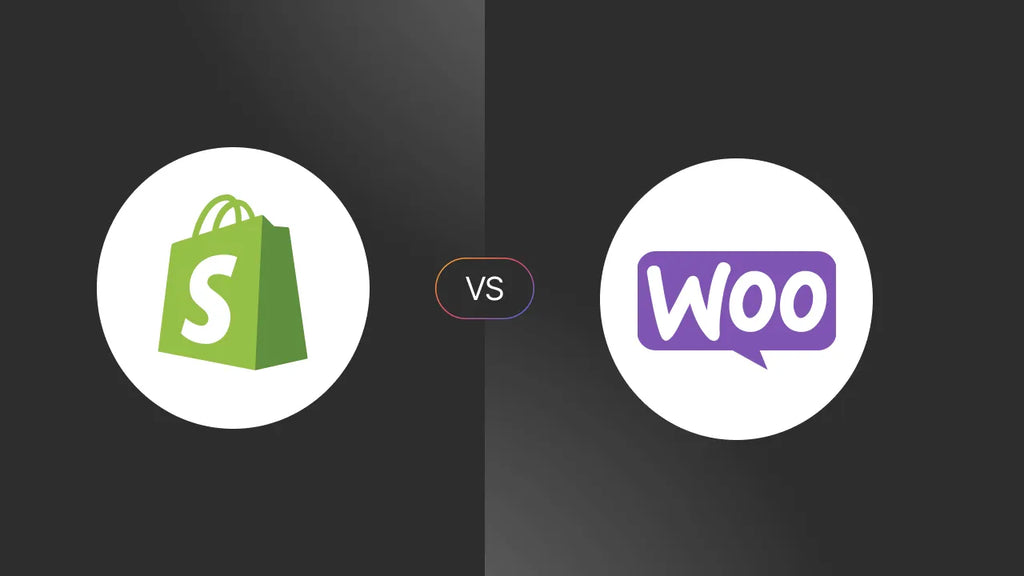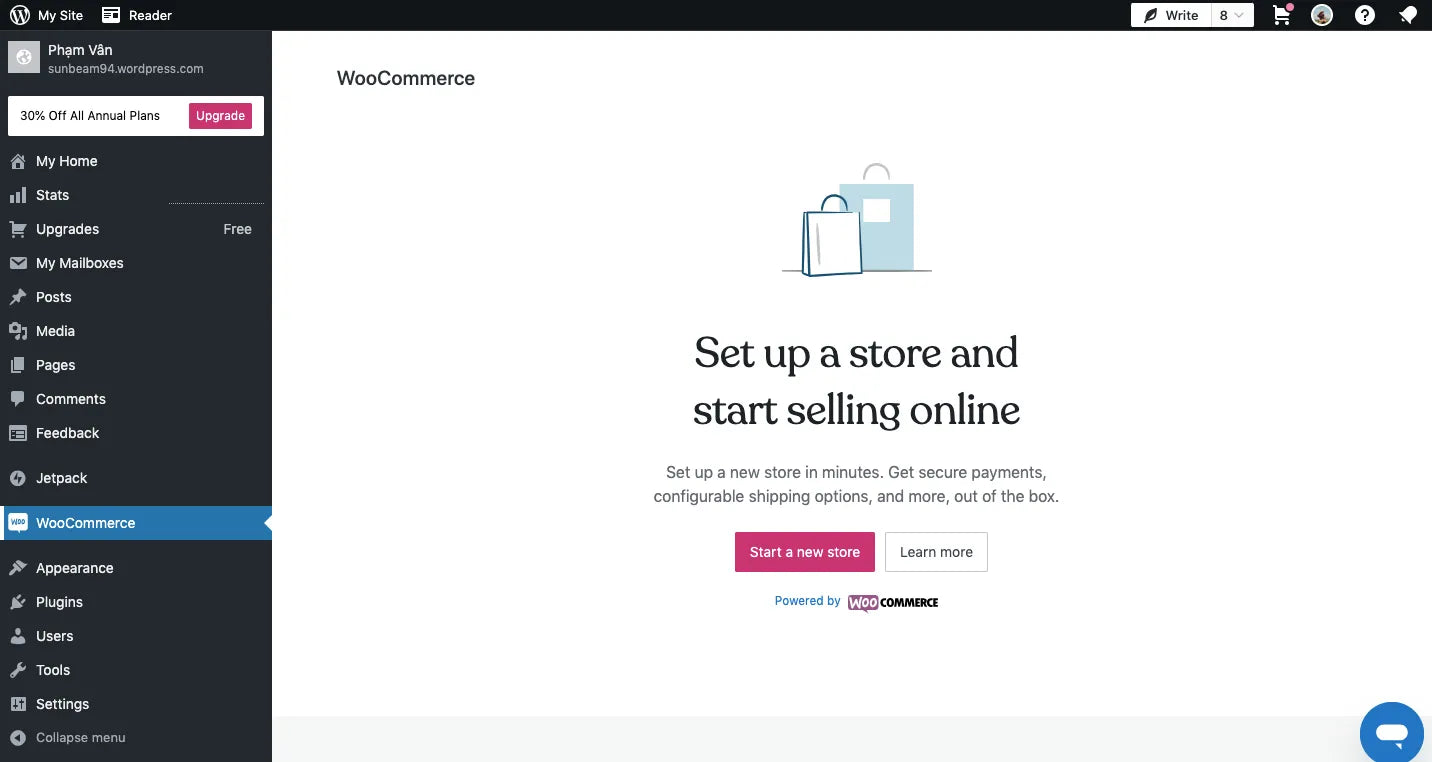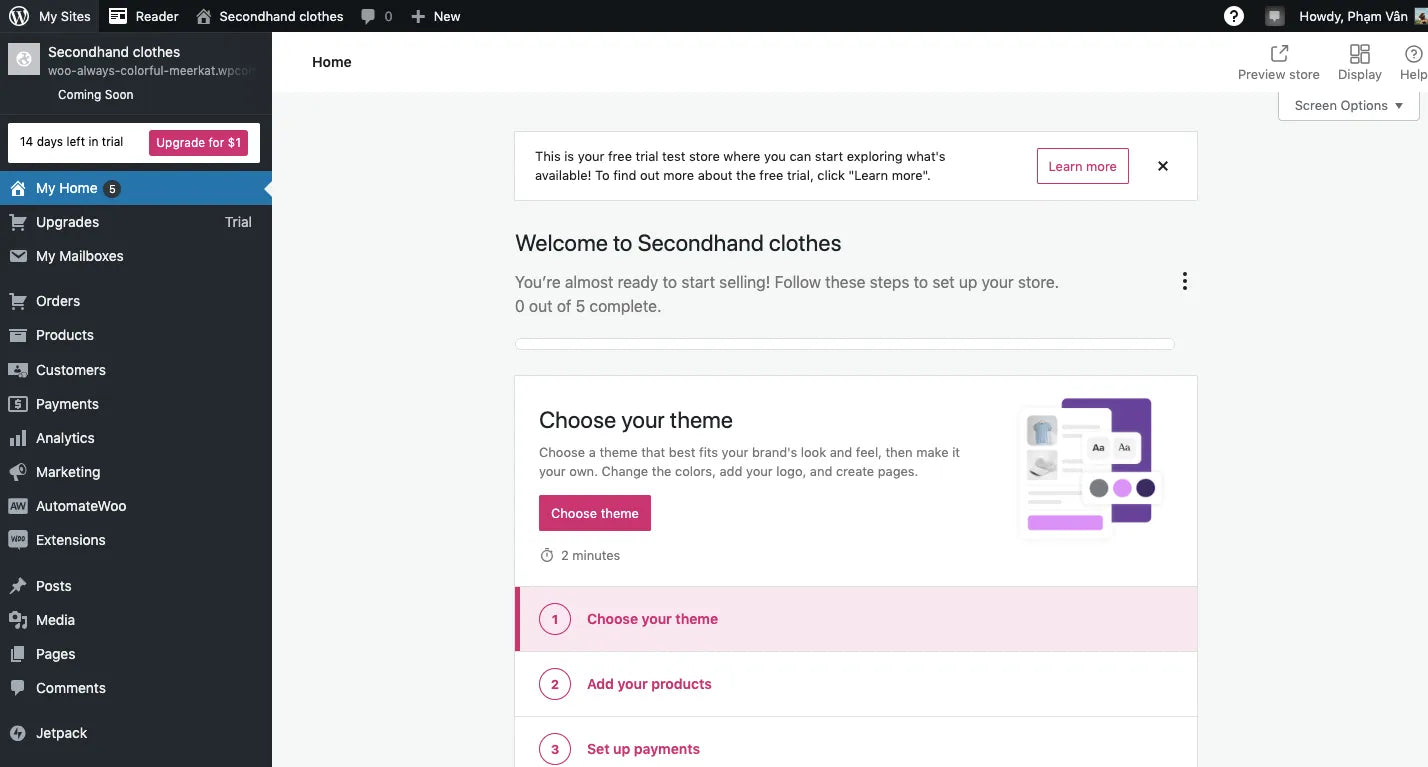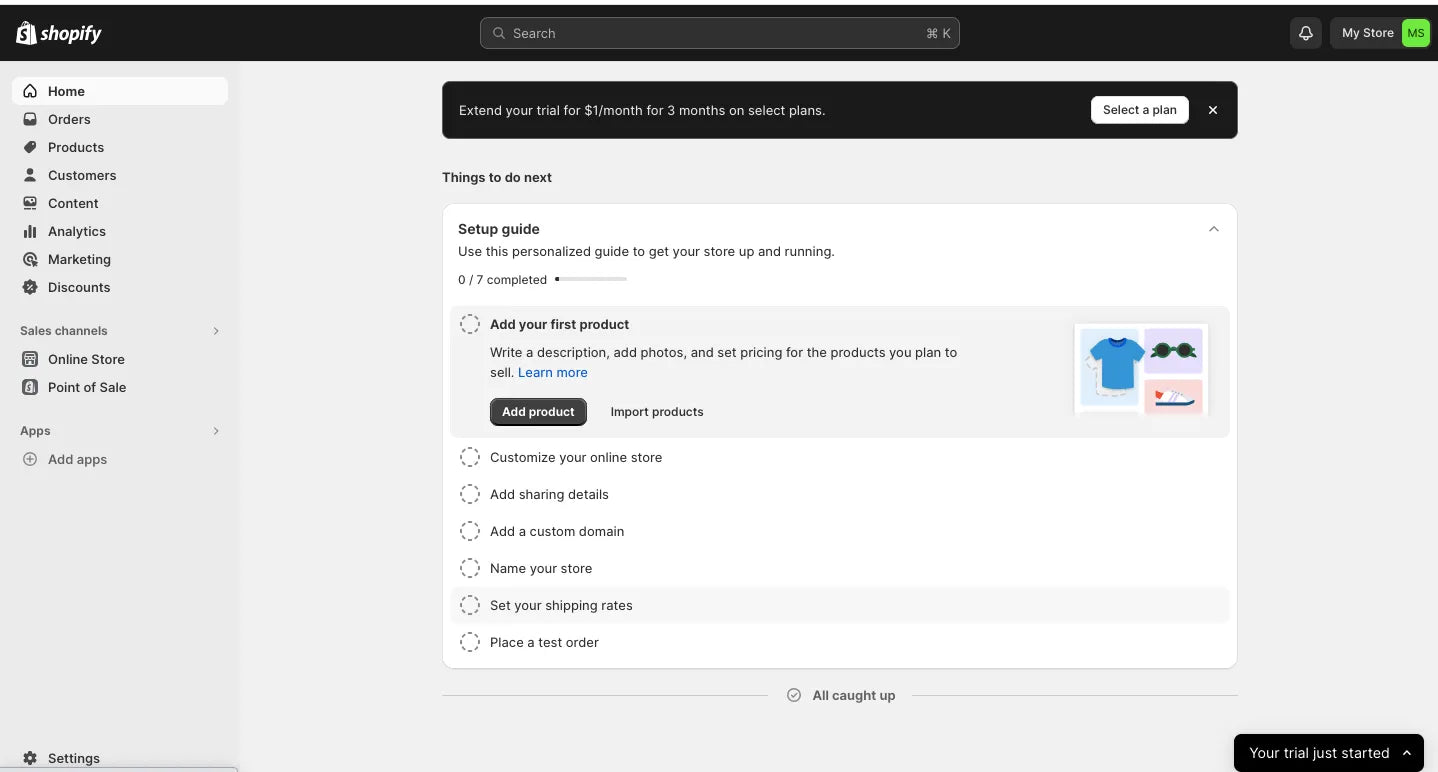Shopify vs WooCommerce: Which One Is Better For Your Business? (Feature-based Comparison)

“Shopify or WooCommerce” might be something to take into account when you are about to enter the eCommerce world. These two most popular eCommerce platforms have empowered millions of online sellers to earn billions of dollars.
However, Shopify vs. WooCommerce has remained the showdown, even among eCommerce connoisseurs. Each has its own pros and cons, making it complicated to choose which one is better for your business.
In this article, we will walk you through a comprehensive comparison of these platforms, breaking down all the crucial aspects that every online seller weighs up before starting a business. The name of the game is to help you find one that suits your business best.
Let’s dive in!
Shopify vs WooCommerce: An overview
Before we dive into the Shopify vs WooCommerce debate, let’s take a quick look at these two eCommerce platforms.
What is Shopify?
Shopify is a fully-hosted platform that helps you build an online store from scratch and run your business with ease.
Founded in 2006, Shopify has quickly become a giant in the eCommerce world, with more than 4 million users worldwide.
The platform offers a complete package solution for online sellers, covering everything needed for online stores like frontstore design, sales tracking, inventory management, reporting, payment, integrated hosting, domains, security, etc.
Shopify is well-known for its user-friendly approach and intuitive interface, making it easy to set up and manage online stores without technical requirements.
Learn more: Shopify Tutorial: How to Set Up A Shopify Store from Scratch for Beginners (2024)
What is WooCommerce?
Released in 2011, WooCommerce is an open-source eCommerce platform built on WordPress, and a so-called WordPress plugin. It enables you to seamlessly transform your WordPress site into an online store with all eCommerce functionalities.
Backed by the most powerful content management system, WooCommerce leverages the robust features of WordPress to help you effortlessly create and manage your online store.
WooCommerce provides flexibility, high customization, and great control over your eCommerce site by taking advantage of its extensive plugins and themes.

Shopify vs WooCommerce: A quick comparison
Let’s first take a brief look at the key differences and similarities between the two eCommerce giants:
|
Points of differences |
|
Shopify |
WooCommerce |
|
Popularity |
|
4,3 million
|
6,2 million |
|
Best for
|
Beginners Dropshippers Large business (Shopify Plus) |
Intermediate business Large-size enterprises |
|
|
(% eCommerce sites use) |
21% |
23% |
|
|
4,5 |
4,1 |
||
|
Features |
Open source |
No |
Yes |
|
Hosting |
Included |
Not included |
|
|
Subdomains |
Included (Unlimited) |
Included (Unlimited) |
|
|
SSL |
Yes |
Yes |
|
|
Blog |
Yes |
Yes |
|
|
Inventory management |
Yes |
Yes |
|
|
Payment gateways |
Yes (Third-party charge)
|
Yes |
|
|
Themes |
+100 free and premium templates |
+11,000 themes |
|
|
SEO tools |
Yes |
Yes |
|
|
Support |
24/7 |
fewer options for support |
|
|
Price |
Trial version |
3-day trial |
15-day trial |
|
Starting price |
$29 per month Includes additional features |
$39 per month Additional costs maybe involved |
Which one is better for your business?
To provide a deeper dive into the distinctive differences between Shopify vs WooCommerce, we break down the most important criteria for eCommerce sellers one-by-one, then give recommendations based on the pros and cons of each. This will help you get a comprehensive understanding of these two behemoths, thereby choosing your perfect match.
Learn more: Start Your Online Business with Shopify–Only $1 for the First 3 Months
Ease of Use
The reason why Shopify and WooCommerce have been on the list of top eCommerce platforms for decades is their easy-to-use approach. If you are looking for an overall solution for online selling, they’ve got you covered with ease.
There is only a slight difference.
WooCommerce is a WordPress plugin, which means you must first have a website built with WordPress CMS, then install the WooCommerce plugin to set up an online store. This may require some technical knowledge and familiarity with WordPress. Users without a WordPress background can find it challenging at first.


On the other hand, all you need to get started with Shopify is to create an account on the platform and set things up on a streamlined dashboard. As a standalone solution, Shopify offers a built-in online store with a user-friendly interface and intuitive process.

Shopify dashboard gives a clear, straight-forward overview of your online store.
Overall, Shopify clearly outperforms WooCommerce in terms of ease of use. If you are a business starter and desire a quick launch, we recommend you go for Shopify, as it minimizes the number of steps required to construct your store.
Learn more: Shopify Tutorial: How to Set Up A Shopify Store from Scratch for Beginners (2024)
Design and Customization
Currently, WooCommerce offers you access to more than 11,000 WordPress themes for free, while Shopify has more than 170 free and paid themes for store design. At a glance, WooCommerce is unmatched with its vast design selections.
Moreover, as an open-source platform, WooCommerce enables users to make the most of WordPress themes available on public theme marketplaces, like ThemeForest. Also, leveraging plugins to customize your stores on WooCommerce with specific features would make your store stand out from the crowd.
That said, Shopify themes are considered to be sleeker and more optimized for sales conversions since they are straightforwardly dedicated to the eCommerce community.
If you prefer advanced customization and full control of your store's appearance and functionality, we vote WooCommerce as the winner.
Of course, the flexibility and customization may cost you investment and coding knowledge, which is lean for companies with a developer team.
For a more streamlined design process, go with Shopify!
Here is some good news: You can definitely customize your storefront on Shopify and address all Shopify’s theme limits by installing a third-party page builder like GemPages. No coding skills required! GemPages vast theme library can be effortlessly accessed and modified by a drag-and-drop theme editor.
Value for money
In October 2023, Shopify replaced the standard 14-day free trial with a 3-day free trial, then $1 per month for the next three months.
It offers multiple pricing plans, including Basic, Shopify, and Advanced, with the subscription fees ranging from $19 per month to $399 per month.

WooCommerce offers a 15-day free trial, then $1 per month for the next 3 months. The price for the essential package is $39 per month, and for the Performance, $70.

It’s important to note that Shopify’s fees cover hosting, domains, security, SSL certification, etc. The extras depend on the paid themes, extensions, and apps you need to install for more features.
Also, Shopify charges transaction fees if you don’t use Shopify payments.
On the other hand, WooCommerce requires additional cost for some features not included in the platform, like hosting, domains, etc. These extras depend on the service providers, not the platform itself.
It’s difficult to choose which one outranks in terms of Cost. The answer depends on the features that your store needs to be customized rather than the actual cost.
Shopify’s all-in-one pricing plan may be clear for you to ensure the budget does not overspend, while WooCommerce provides you more flexibility to adjust your payment.
SEO
Both platforms are SEO-friendly, giving you freedom to optimize various aspects of SEO measures, including title, descriptions, meta tags, URLs, sitemaps, etc.
Though the two platforms include all core SEO functions for an online store, WooCommerce has more advantages as it benefits from robust WordPress's SEO capability. Also, there are numerous additional SEO plugins for WordPress that can be installed in your WooCommerce store to leverage SEO performance.
Customer Service
Both platforms provide 24/7 support on all plans and an extensive Help Center with a wide range of guides, tutorials, documentation, and frequently asked questions. In addition, both have huge and active community forums gathering users worldwide where you can discuss, exchange experiences, and seek help.
One thing to be noted: Some WooCommerce issues may be hard to track down as the support depends on different hosting providers, plugin developers, etc.
If we had to choose a better one for support service, Shopify would be better.
Security
Security must be a top priority when building an online store, as hackers can gain access to customer data, credit, and debit card information, which damages your business.
Not every eCommerce seller, especially newcomers, is familiar with dealing with security issues. However, the Shopify all-in-one package makes it problem-free. As a hosted platform, Shopify offers you built-in security, meaning it takes care of your web safety from scratch.
Meanwhile, to protect your online shop on WooCommerce, you need to download security plugins or reach out to a service provider to configure this additional functionality on your store.
This separation requires effort to research and choose trustworthy partners.
This doesn’t lead to the conclusion that WooCommerce is less secure than Shopify. However, arming security for a WooCommerce store would take more time and effort and would be even more costly. For that reason, Shopify might be a wise choice that gives you peace of mind when setting up your business.
Learn more: Shopify Features and Benefits — a Detailed Overview
Pros and Cons of Shopify and WooCommerce: A Summary
Alright, we’ve got you covered with the nitty-gritty comparison of Shopify vs WooCommerce. A table below will give you a quick summary of their advantages and disadvantages.
|
|
Shopify |
WooCommerce |
|
Pros |
|
|
|
Cons |
|
|

Final thoughts
It has never been easier to start an online business today with the support of powerful eCommerce platforms.
However, a tool is simply a tool! You are the one who defines your success by making the most of this eCommerce power, starting with a decision on the right platform to run your online store.
Keep in mind that there is no best eCommerce platform, but the one that suits you best.
We hope the above ultimate comparison has provided you with a thorough understanding of Shopify vs WooCommerce, especially their pros and cons, thereby helping you decide which one is your best fit.



 Facebook Community
Facebook Community Change Log
Change Log Help Center
Help Center










